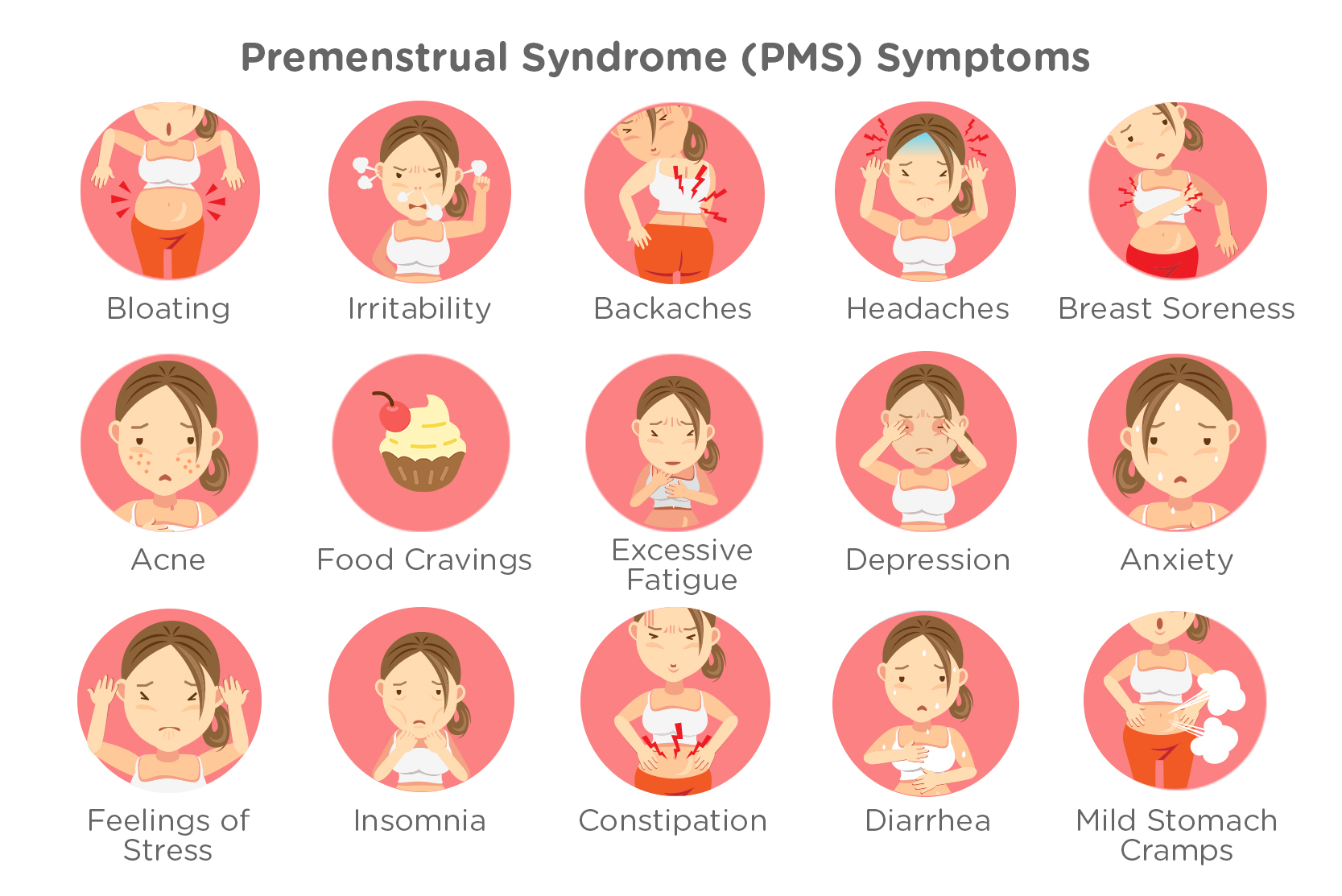PMS and Appetite: A Common Connection
Many individuals experience increased hunger right before their period, and this phenomenon is closely linked to Premenstrual Syndrome (PMS). PMS is a collection of symptoms that some people may encounter during the latter phase of their menstrual cycle, typically in the 5 days leading up to their period. While PMS symptoms can vary greatly from person to person, increased appetite and hunger are common experiences for many. This article will delve into the potential reasons behind this phenomenon and offer some coping strategies.
Hormonal Fluctuations: The Primary Culprit
During the menstrual cycle, hormonal changes can significantly impact various aspects of a person’s physical and emotional well-being. In particular, increased levels of progesterone during the latter phase of the cycle can contribute to increased hunger and appetite. Progesterone is a hormone that plays a crucial role in preparing the body for a potential pregnancy, thickening the uterine lining to support a fertilized egg. However, this hormonal shift can also have the side effect of stimulating appetite and hunger.
To better understand this phenomenon, it’s helpful to have a basic understanding of the menstrual cycle. The cycle is typically divided into two main phases: the follicular phase and the luteal phase. The follicular phase begins on the first day of a person’s period and lasts until ovulation, which is when a mature egg is released from the ovary. During this phase, estrogen levels gradually increase, stimulating the growth of the uterine lining and preparing the body for a potential pregnancy. After ovulation, the luteal phase begins, and progesterone levels rise, further thickening the uterine lining and creating a nurturing environment for a fertilized egg. If pregnancy does not occur, progesterone levels will drop, signaling the shedding of the uterine lining and the start of a new menstrual cycle.
It’s during this luteal phase, when progesterone levels are at their highest, that many individuals experience increased hunger and appetite. This is likely due to the hormone’s effects on metabolism and energy regulation. Progesterone can influence the body’s metabolic rate, causing it to burn calories more slowly and increasing the sensation of hunger. Additionally, progesterone can impact the body’s levels of ghrelin, a hormone that stimulates appetite, and leptin, a hormone that signals satiety or fullness. Elevated progesterone levels can lead to an imbalance in these hormones, further contributing to increased hunger.
The Role of Serotonin in Appetite Regulation
Serotonin is a neurotransmitter, a chemical messenger in the brain that plays a crucial role in regulating mood, sleep, and appetite. Fluctuations in serotonin levels can significantly impact a person’s experience of hunger and fullness. During the menstrual cycle, serotonin levels can fluctuate due to the hormonal shifts that occur, potentially leading to increased hunger and appetite right before a period.
Estrogen and progesterone, the two primary hormones that regulate the menstrual cycle, can influence serotonin levels in different ways. Estrogen, for example, can increase the availability of serotonin in the brain, making it easier for the neurotransmitter to bind to its receptors and exert its effects. Progesterone, on the other hand, can have the opposite effect, reducing the availability of serotonin and making it more difficult for the neurotransmitter to bind to its receptors. This imbalance in serotonin levels can lead to changes in appetite and hunger, particularly in the latter phase of the menstrual cycle when progesterone levels are at their highest.
Additionally, serotonin plays a critical role in regulating mood and emotional states. When serotonin levels are low, individuals may be more prone to experiencing negative emotions, such as anxiety, depression, and irritability. These negative emotions can further contribute to increased hunger and appetite, as people may turn to food as a way to cope with their feelings. By understanding the relationship between serotonin and appetite, individuals can take steps to support their serotonin levels and manage their hunger and cravings more effectively.
Lifestyle Factors: Sleep and Stress
In addition to hormonal fluctuations, lifestyle factors such as sleep deprivation and stress can also contribute to increased hunger and appetite right before a period. These factors are closely linked to the menstrual cycle and can exacerbate the symptoms of PMS, including changes in appetite and hunger.
Sleep deprivation can have a significant impact on appetite and hunger, as it can disrupt the body’s hormonal balance and lead to changes in the regulation of these processes. During sleep, the body produces several hormones that play a crucial role in regulating appetite, including ghrelin and leptin. Ghrelin is a hormone that stimulates appetite, while leptin is a hormone that signals satiety or fullness. When a person is sleep-deprived, their body may produce more ghrelin and less leptin, leading to an increase in hunger and appetite. Additionally, sleep deprivation can lead to changes in the body’s metabolism, further contributing to increased hunger and appetite.
Stress is another common factor that can contribute to increased hunger and appetite right before a period. During times of stress, the body produces higher levels of cortisol, a hormone that can stimulate appetite and lead to cravings for high-calorie, high-fat, and high-sugar foods. Chronic stress can also lead to changes in the body’s metabolism, further contributing to increased hunger and appetite. Moreover, stress can disrupt the body’s hormonal balance, leading to changes in the regulation of appetite and hunger.
To manage sleep deprivation and stress during the premenstrual phase, consider implementing the following strategies:
- Establish a consistent sleep schedule by going to bed and waking up at the same time each day, even on weekends.
- Create a relaxing bedtime routine that includes activities such as reading, taking a warm bath, or practicing relaxation techniques such as deep breathing or meditation.
- Limit exposure to screens and electronic devices before bedtime, as the blue light emitted by these devices can disrupt the body’s production of melatonin, a hormone that regulates sleep.
- Engage in regular physical activity, as this can help reduce stress and improve sleep quality.
- Practice stress-reduction techniques such as yoga, meditation, or mindfulness.
- Seek support from friends, family, or a mental health professional if stress is impacting your daily life or causing significant distress.
Strategies for Managing Pre-Period Hunger
How to Navigate Increased Hunger Before Your Period
Managing increased hunger before a period can be challenging, but there are several practical tips and strategies that can help. By incorporating these strategies into your daily routine, you can support your body’s hormonal and metabolic processes and maintain a healthy appetite and hunger level.
First, consider eating balanced meals that include a variety of nutrient-dense foods. A balanced meal should include a source of protein, healthy fats, and complex carbohydrates. Protein can help regulate blood sugar levels and keep you feeling full and satisfied, while healthy fats can support the absorption of fat-soluble vitamins and provide a sustained source of energy. Complex carbohydrates, such as whole grains, fruits, and vegetables, can provide fiber and essential nutrients that support overall health and well-being.
Second, stay hydrated by drinking plenty of water throughout the day. Dehydration can sometimes be mistaken for hunger, leading to increased food intake and potential overeating. By staying hydrated, you can support your body’s metabolic processes and maintain a healthy appetite and hunger level.
Third, consider incorporating healthy snacks into your daily routine. Snacks can provide a source of energy and nutrition between meals, helping to regulate blood sugar levels and support overall health and well-being. Choose snacks that are nutrient-dense and include a source of protein, healthy fats, and complex carbohydrates. Some examples of healthy snacks include nuts and seeds, fruits and vegetables, hummus and whole-grain crackers, or Greek yogurt with berries.
Finally, be mindful of your hunger and fullness cues. Pay attention to your body’s signals and eat when you are hungry and stop when you are full. By practicing mindful eating, you can support a healthy relationship with food and maintain a healthy appetite and hunger level.
The Importance of Self-Compassion
Dealing with physical changes during the menstrual cycle, such as increased hunger, can be challenging. It’s essential to approach these changes with self-compassion and kindness, rather than self-criticism or judgment. Self-compassion involves treating oneself with the same kindness, care, and understanding that one would offer to a close friend.
When experiencing increased hunger before a period, it’s essential to remember that this is a normal and common experience for many individuals. Instead of criticizing oneself for experiencing these changes, consider reframing the experience as an opportunity to nourish and care for the body. By approaching increased hunger with self-compassion, individuals can reduce feelings of guilt or shame and promote a healthier relationship with food and their bodies.
To practice self-compassion during the menstrual cycle, consider the following strategies:
- Speak to oneself with kindness and understanding, using positive and affirming language.
- Practice self-care activities, such as taking a warm bath, practicing relaxation techniques, or engaging in activities that bring joy and pleasure.
- Seek support from friends, family, or a mental health professional if experiencing significant distress or difficulty coping with physical changes during the menstrual cycle.
- Remember that physical changes during the menstrual cycle are temporary and will pass with time.
- Avoid comparing oneself to others and recognize that everyone’s experience of the menstrual cycle is unique.
When to Consult a Healthcare Professional
While increased hunger before a period is a common experience for many individuals, it’s essential to seek medical advice if experiencing severe or persistent symptoms. Consult a healthcare professional if experiencing any of the following symptoms:
- Significant changes in appetite or hunger levels that interfere with daily life or normal activities.
- Unexplained weight gain or loss.
- Persistent or severe premenstrual symptoms that interfere with daily life or overall well-being.
- Difficulty managing stress or anxiety related to the menstrual cycle or other life events.
- Other concerning symptoms, such as irregular periods, heavy bleeding, or pelvic pain.
A healthcare professional can help identify the underlying causes of changes in appetite and provide personalized treatment recommendations. Treatment options may include lifestyle changes, such as improving sleep quality and managing stress, or medical interventions, such as hormonal therapy or nutrition counseling.
Remember that seeking medical advice is an essential part of maintaining overall health and well-being. By consulting a healthcare professional, individuals can better understand their bodies and develop strategies for managing changes in appetite and other menstrual cycle symptoms.
Conclusion: Understanding and Managing Pre-Period Hunger
In conclusion, increased hunger before a period is a common experience for many individuals, and understanding the potential reasons behind this phenomenon can help individuals better manage their symptoms. Hormonal fluctuations, particularly the increase in progesterone, can lead to increased hunger and appetite, as can changes in serotonin levels and lifestyle factors such as sleep deprivation and stress.
To manage increased hunger before a period, consider implementing practical strategies such as eating balanced meals, staying hydrated, and incorporating healthy snacks. Additionally, prioritize self-compassion and kindness when dealing with physical changes during the menstrual cycle, and seek medical advice if experiencing severe or persistent symptoms. By understanding and managing pre-period hunger, individuals can support their overall health and well-being during the menstrual cycle and beyond.
We hope that this article has provided valuable insights and strategies for managing increased hunger before a period. We encourage readers to share their experiences and tips in the comments section, as engaging in a supportive community can help individuals feel less alone and more empowered in managing their menstrual cycle symptoms.









